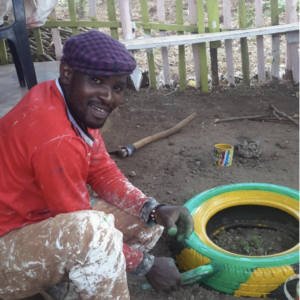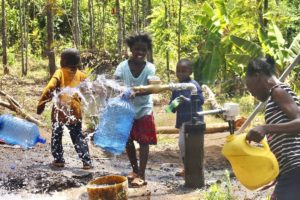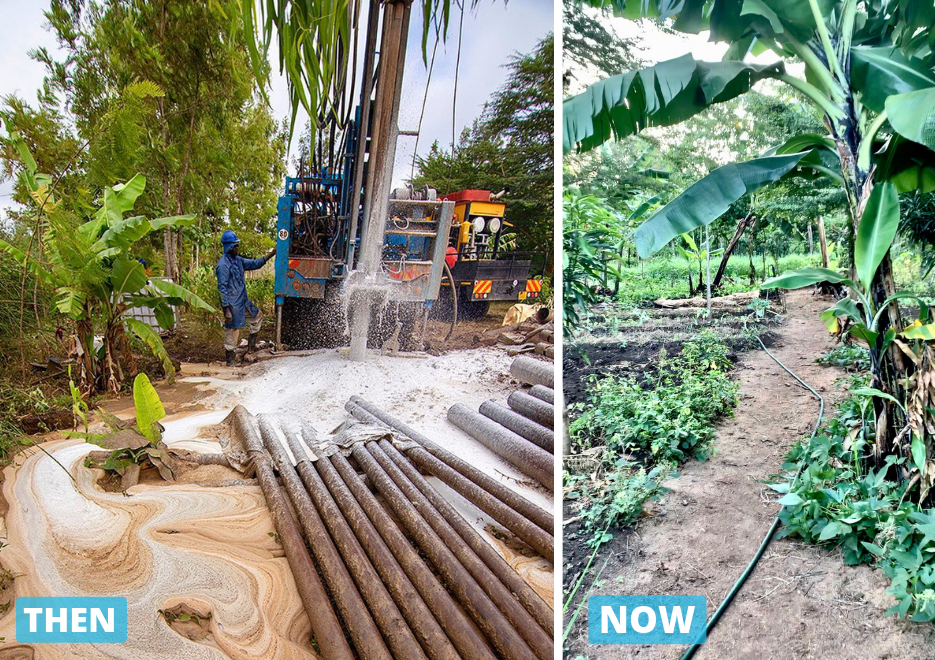Kithoka, Kenya
Kithoka, Kenya: The Impact of Clean Water In Action
It’s been nearly a year and a half since our team was in Kithoka, Kenya, drilling a brand new clean water well for the community of nearly 10,000 people. Upon return to this site exactly a year later, the impact that clean water has had on the community can be seen almost everywhere you look. Crops are flourishing, food scarcity issues have diminished, and the quality of life for those in Kithoka has greatly improved almost overnight. But, as nice as it might be to relish in these accomplishments, it is important to recognize and reflect on what life was like for those before the well was implemented and why we do this work in the first place. Water is life, and its absence affects every facet of daily activity and community development.
Before our visit to Kithoka, evidence of the water crisis could be seen in every direction. Clean water was difficult to come by.
- While the community did have private and county-wide water pipelines, the water was rationed and determined to be polluted. Those who could not afford access to pipeline water had to collect water from nearby ponds and streams, which were also contaminated. Both sources of water in the community resulted in high numbers of waterborne illnesses.
- The only semi-reliable source of clean water was rainwater, which was difficult to store for many residents, and also had to be rationed
- Rainwater was still not fully reliable, as droughts are a common occurrence in the area.
 With these limited sources, it was difficult for the community to find sufficient water to use for bathing, drinking, and cooking. It also negatively impacted their ability to take care of their crops, leading to a lack of food, and contributing to slower economic growth.
With these limited sources, it was difficult for the community to find sufficient water to use for bathing, drinking, and cooking. It also negatively impacted their ability to take care of their crops, leading to a lack of food, and contributing to slower economic growth.
These issues are not assumed– we conduct thorough community and geological surveying to determine the depth of water issues and the needs of each partner community. When our team visited Kithoka, a member of the community, Koome, told us that his biggest challenge was the lack of clean drinking water. The river water, which he primarily used, is not treated and is dirty in color. The river also runs dry, costing him his crops as the yield is reduced.
Another community member, Mukami, told us: “It’s tiring [going back and forth to the river]; you can only carry one jerrycan at a time, for cooking, laundry, dishes, and other small house chores. For additional cleanliness it means many trips to the river, so you minimize your laundry by wearing the same clothes over and over again. If we got water here, the kids would also have an easy time because their evenings won’t be spent running to the river for water. It also would reduce their risk of death as they might slip and fall in the river.”

Now, after many months of planning, project implementation, and working with the community to develop the most sustainable clean water solution to fit their needs, life in Kithoka is very different.
Community members no longer waste time and energy collecting water from the polluted river. Water is now fresh, clean, and readily available for everyone in Kithoka. There are fewer waterborne illnesses, leaving the community healthier overall, and gone are the days of not having enough water for daily activities necessary. They no longer have the looming stress of having to ration their water supply.
The International Peace Initiatives, an NGO in the community, transformed the area surrounding the clean water well into a sustainable food center. There are rows of crops, trees, and even a fish farm (pictured at the top). There is enough clean water coming from the well to sustain these growing sources of nourishment while leaving plenty of clean water for community members to sustain their basic needs, such as drinking, cooking, cleaning, and farming.
With all of the improvements made to the quality of life for those in Kithoka, we can’t wait to see the community grow and develop with this new, reliable source of clean water. We are grateful to have the opportunity to give the gift of life to communities like Kithoka and we hope that the lives of those in Kithoka continue to improve and flourish every single day.
